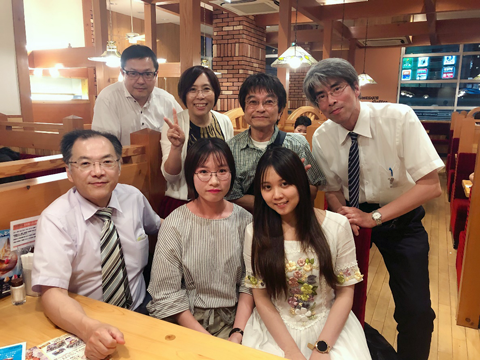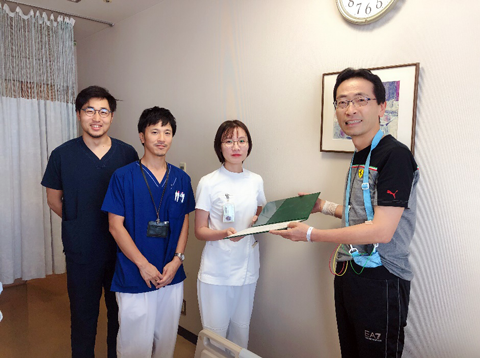国際・国内交流
陈月焜(Chen Yuekun)さん(汕頭大学医学院第4学年次)
Experience in Department of Pathology, Division of Surgical Pathology
The first day I went to department of Pathology, I was taken to say hi to the staff, nodding, and bowing. They all warmly welcomed me. Then, I began to follow Hashikura Teacher to do the experiment of mutation testing for gastrointestinal stromal tumors, including taking samples from pathological slides, dewaxing, extracting DNA, doing Gold PCR, electrophoresis, and finally sequencing the sample. Before I started the experiment, Hashikura Teacher gave me a series of experimental steps. Although all of materials were written in Japanese, I carefully observed teacher’s operation and each step corresponded to the steps on the materials. When I could not follow the procedure, I asked questions and gradually understood the meanings on the materials. In the first week, I did the experiment under the teacher’s guidance. Once, I was too nervous to accidentally pour the reagent on the laboratory bench. I immediately apologized to the teacher, but she smiled and said that it didn’t matter, which made me feel she was really so kind and nice. In the second week, I started to do the experiment by myself. I have to confirm every step again and again, avoiding making mistakes. Sometimes if one step was not clear, I would ask the teacher. She would always kindly answer my questions and encourage me. She did not speak English fluently. In order to make me understand, she asked a senior Chinese student in the department to translate for me or wrote the meaning on paper. Before leaving this department, I also reported my work and experiment results to the Professor Hirota. He pointed out some deficiencies in my report and discussed with me some new knowledge on scientific research. This urged me to study harder.
In the third and fourth week, I went to the department of Obstetrics and Gynecology, where I met a number of teachers and mainly learned about assisted reproductive technology. Ukita Teacher is one of my supervisors, who took care of me most. He was also not so good at English, but I knew he tried his best to let me understand his meaning and I really appreciated it. I was taken to observe the artificial insemination, ova collection, embryo transfer, etc. I also went to the operating room and the outpatient clinic of reproductive medicine. There was pleasant music played in the clinic, examination room and operating room to relax patients, which is rare in China. The relationship between doctors and patients is very harmonious, and the humanistic care there is particularly good. What’s more, the patients’ privacy is well protective. At the operating room, there is a camera lens facing the operating field, therefore, the student who is watching the surgery do not have to stand next to the doctor, but can directly see the doctor's operation clearly from the screen at the operating room, which is new for me. Every Wednesday afternoon, I attended the medical meeting, where doctors discussed and learned about their special cases. Although I did not understand the Japanese, I could see their serious attitude towards learning. Before I left, the Professor Shibahara who was hospitalized still awarded me the certificate in the ward, which makes me so moved and thankful.
In summary, I experienced how advanced the foreign laboratory was and how humanistic the medical service was in this four weeks. In addition to getting to know the pathological diagnosis of gastrointestinal stromal tumors and various techniques of reproductive medicine, I also enhanced my ability to do experiments, expanded my vision and broadened my thinking. Besides, through my daily life and sightseeing to other city like Osaka, Nara, Kobe at weekends, I experienced the Japanese culture. I am very grateful to Hyogo College of Medicine and my dear college (Shantou University Medical College) for giving me such an excellent opportunity to study. This experience is unforgettable to me and inspires me to work harder to improve myself in the future.

